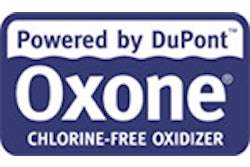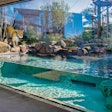
From your perspective, what are you seeing in terms of industry growth this past year?
I'm hearing that contracts are way, way up. I've talked to a number of builders who are saying they have signed contracts in hand and are now building a normal number of new pools for the first time in a long time. The customers that have come back to the market are mostly paying cash, but they are confident enough to the take the leap.
What's driving the improvement?
It's difficult to tell how much is due to the economy or the weather. We had a wonderfully mild winter and builders I talk to have said they've seen this before, where consumers perk up earlier in the season anticipating being able to extend the swimming season by getting the pool built early in the spring. So you always have to be careful in judging how well the market's really doing.
The general consensus is, however, that the economy has genuinely improved with consumer confidence increasing. I certainly wouldn't take a stand as to whether or not it's the economy or the weather. Most likely, the improvements we're seeing this year are a combination of the two.
The good news is that I don't hear anyone saying that we're going to stay flat or head back down. I believe it's finally safe to say we've seen the bottom and are headed in a positive direction.
What long-term effects did the recession have on the builder segment of the industry?
It's interesting, for years I would hear builders say that one of their biggest problems was that they had so much competition around them competing purely on price that they believed the industry actually needed a recession to weed out the fly-by-night competition. I used to think that was short-sighted.
As it turns out, however, they might have been right. A number of builders experienced a strong rebound in 2011 and many attribute that turnaround to decreased competition from a smaller number of less qualified companies.
Does that qualify as a silver lining?
I'm not sure I'd go that far because there's another trend to consider. I was recently at a Builders Council meeting where a number of people were discussing the impact of the "build it yourself" trend, where homeowners essentially replace the pool builder and pay subs for each phase of construction.
There's a two-pronged story there. First the homeowner saves the cost of the pool builder. That's obvious. The second part is that when the recession was in full swing, some pool builders with cash flow problems would fail to pay the subs and the homeowner would wind up with all these liens against their property. With the "build it yourself" approach, homeowners pay the subs directly and don't risk having liens filed against them.
That message took hold in the recession because the pool could be built cheaper and in the end you'll have fewer problems with liens. Subs won't walk off the job because they're not being paid. By contrast, builders might leave the pool half finished with a pile of problems. The recession was ready-made for that marketing pitch and it definitely had an impact on builders.
In some markets, such as northern California where somewhere around half the builders went out of business, those people who are no longer in the industry would tell you the main reason was the build-your-own-pool trend.
How should the industry respond?
We need to increase the credibility of the builder segment. One of the things we want to accomplish through the Builders Council is to develop a campaign that encourages consumers to go to APSP and find a Certified Professional Builder because those builders have to have a number of check marks by things they've done to earn the CPB certification. That will give homeowners the best chance of a positive outcome for their project. If they can't afford to do that, they should be encouraged to at least back up and hire someone who's a member, because it is a professional organization. That's why there's a cry from many APSP members to not just accept members who are willing to pay, but those that meet a set of standards for membership.
Do you think that overall builders sharpened their skills during the downturn as a way to increase credibility and skill sets?
Unfortunately no, I'd say that most people cut back on education as a way to save money. Another thing that happened along similar lines is that a number of companies started selling projects without the use of salesmen. In fact, when the recession hit one of the first things that happened was a number of companies let go their sales guy, who was probably working on a $5,000 a month draw with the potential of making $100,000 a year if they sold a lot of pools.
That meant that in many cases, the owner of the company, who often has decades of experience in the industry, did the selling, sitting in living rooms with homeowners explaining why his company should design and build their project. Those companies gained the advantage of having someone working directly with the consumer who explains why things are the way they are as the project moved forward.
With salespeople, there's often a broad disconnect between the sales process and design and construction. They might be good at making the initial sale, but for the most part they have lacked any kind of detailed specific knowledge of design and construction.
I think what needs to happen is we need to train salespeople so that they are equipped with design and construction knowledge, at least from a classroom standpoint, so they can serve as knowledgeable representatives throughout the process. That hasn't happened yet.
Where do landscape architects fit into these trends?
A number of builders have teamed up with landscape architects almost as a matter of self-defense because landscape architects have already moved into the market and taken control of the process with homeowners.
Oftentimes, the landscape architect, who might be a person in their late twenties or early thirties, comes in with the credibility of a formal educational background and license. They tell the homeowner that they will design their entire backyard, including the pool, outdoor kitchen and all the other features. Once the space is designed, then builders bid against each other to get the job. That means the builder is basically a commodity and has an extremely tough time making any money.
We saw this happening even prior to the recession because consumers are now more than ever interested in the entire environment. As a result, landscape architects are often better equipped to win the affections of the client than a pool builder, who might have a lifetime of experience, but lacks formal education. Instead of taking charge of the entire project the way a landscape architect does, the builder would likely farm out the design and construction of the gazebo, pool house or outdoor dining area to someone outside their company they've worked with in the past.
Does that mean the pool and spa industry should adopt a broader focus?
We certainly should look at the bigger picture of the consumers' experience. There's no question that many homeowners, particularly high-end consumers who have resources to purchase fully designed outdoor spaces, make spending time with family and friends at home a major priority.
Having a place at home that enables them to attract their close relations to their home has become a much greater priority than the next Ferrari or expensive vacation.
As an industry, what's the best way to take advantage of that trend?
We need to aggressively promote the idea that pools are fun because ultimately it's the experience that drives the decision to buy.
Let me put it another way; for a husband and wife who are fortunate enough to be shopping for an upscale home right now, one of the things we've seen is that the presence of a fully developed outdoor environment can make a significant difference in the value of the property, maybe as much as 20 percent — everything else being equal.
But saying that, the most important element in the landscape is the presence of a pool. Luxury homes that lack a pool feel incomplete. The absence of a pool leaves a huge void that is really noticeable.
Another factor to keep in mind is that when we talk about the "experience" of owning a pool, we're not talking about swimming or playing in the water. Back in the early '80s there was a study that determined that as much as 95 percent of the pools in the country never have their surface disturbed by a person entering the water, for any reason. Yet, many of those same people who don't go in the water said that their pool was their favorite feature in their home.
That might seem a major disconnect, but the fact is, many people love being next to the water, whether it's in a social setting or just relaxing with a cup of coffee. That's something that never really changes.
How important have renovations been in sustaining the industry lately?
Not as much as most people would think. In past recessions, renovations were extremely important and this time around, a lot of people thought that would be the case again. This time, however, because the recession was so much deeper and the housing market was hit so hard, there's wasn't equity to fuel home improvements. Also, many people began thinking in terms of simply surviving the down time and judging purchases in terms of wants versus needs.
As much our industry would like to think that looking at worn-out plaster would motivate people to renovate their pools, most homeowners didn't see it as a need.
The good news is that many people have now become tired of putting off buying what they want and with the economy starting to improve they have the confidence to move forward.
At this point, I'm optimistic that we're finally seeing significant improvement. We'll know more as we head into the heart of the building season.











































